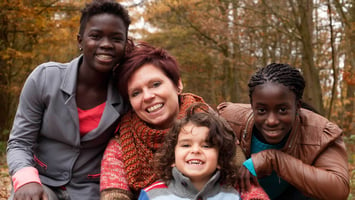Many times, foster parents are tasked with cutting through barriers of fear, anxiety, and discomfort to connect with children they’ve only known for a short time. But it’s critical that they make the effort.
Children in foster care often feel alone, unloved, and unheard. When you listen to their needs and try your best to communicate, you’re taking the first step toward providing them with a loving family and a happy home.
Another great way to connect with your foster child is to learn from the past experiences of others. Here are six things real foster children have said they wished their foster parents had known.
Download Now: The Essential Guide To Becoming A Foster Parent In Washington State
1) “I don’t trust anyone.”

The majority of children in foster care are victims of neglect, and sometimes even abuse. They’ve lived their lives being promised things that don’t come true. Whether those promises come from biological parents, caseworkers, or other foster parents, the result is always the same. Trusting anyone than themselves feels impossible.
Be patient with your child as you work on building trust with them over time. Understand that if they seem shy or secretive, it’s likely due to past experiences where their trust in others was broken.
2) “I’m scared, so I’m going to lie.”
“Just once, if someone would have said to me, ‘It’s OK that you didn't tell me the truth because I understand that you're afraid to do so,’ I might have felt a bit safer.” — Lara B. Sharp, former foster child
Foster children are often scared of things you may not have any experience in. They might be scared of being left alone, of going back to a group home, or of never seeing their parents or family again.
Know that to them, these aren’t minor fears. They’re powerful motivators for a child to do whatever it takes to protect themselves from bad things happening.
In some cases, that may mean lying. Make sure your child feels safe by sticking to your promises and being clear whenever you communicate with them.
3) “I don’t feel like I belong.”

For children, foster care doesn’t just symbolize separation from their biological parents. In some cases, it may mean losing contact with extended family, friends, and community.
When children lose everything and are placed in a completely new situation, it only makes sense that they don’t feel like they belong. As a foster parent, it’s your job to understand that sentiment and do everything in your power to make them feel at home.
You can help that process by connecting with a child’s biological parents to learn about their favorite games to play, their bedtime routine, or favorite activities. You can also support communication with a child’s extended family and friends, so they can stay connected.
4) “I desperately want stability.”
Studies show that children in foster care move homes an average of four to six times. Some may move nearly three times that amount. Think about how difficult it would be as a child to move that often, even if you had your family by your side.
Foster children are deprived of the type of stability that most children take for granted. That loss of stability can lead to anxiety, fear, and depression in children unequipped to cope with such chaotic lives. Fortunately, there are things you can do to help.
Create stable routines for your foster child that they can come to rely on. Routines centered around going to school, taking part in after-school activities, and family dinners all help to establish stability in a child’s life, even when everything else seems to be out of their control.
Above all else, foster parents give their child stability by supporting reunification. Study after study has shown that reunification offers the best opportunity for children and their biological parents to return to a permanent, stable life together.
5) “I want to know when it’s not working out.”

Because of the trauma they’ve had to go through, most foster children exhibit far more maturity than their peers who may not have had similar experiences. When a foster situation isn’t working out, it’s up to the foster parents to be honest with a child about the reasons.
It’s also the foster parent's responsibility to do everything in their power, like counseling, to try and make things work out.
If it’s not working out, be up front and honest with them. There’s nothing worse than thinking your foster parents are off at the grocery store when, in fact, they’ve called someone to pick you up and take you to a new home without a notice.
6) “I need a chance to find myself.”
“What I wish foster parents would know is that we need support and guidance to find ourselves. Please support the children that you bring in your home to explore themselves. Let them explore new things, introduce them to new things. And teach them new things.” — Zahira J. Gonzalez, former foster child
Foster children have their own culture, interests, and hobbies. And they have a curiosity to explore new things that will help shape their personalities.
As foster parents, it’s understandable to want to share your own beliefs and interests with a child. But do it in moderation.
Support their activities, learn as much about their background as you can, and do whatever it takes to keep them engaged and connected with their culture and extended family who hold the key to a major part of a child’s identity.
Want to learn more about supporting a foster child in your home? Get answers to the most common questions about foster parenting by downloading our free resource: The Essential Guide To Becoming A Foster Parent In Washington State.




